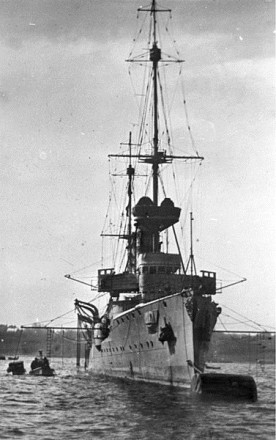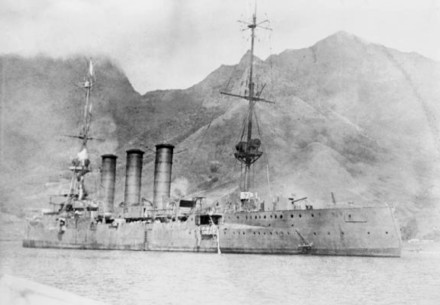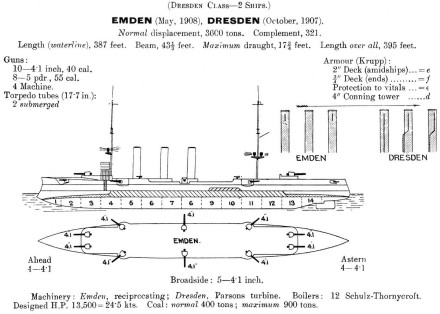History
Service
SMS Dresden was completed in 1907 as the sister ship to the SMS Emden, and was the first German cruiser to be equipped with modern turbines for propulsion. In 1914, on orders of admiral Lüdecke was preparing the ship to return to Germany from the Caribbean, where she had aided in the journey into exile of Mexican president Victoriano Huerto to Jamaica. As the Dresden was about to sail home, World War One broke out, and she was ordered to prepare to begin raids.

Having rendezvoused with the German East Asia Squadron, under the command of admiral Maximilian von Spee, the Dresden participated in several battles, the most famous of these being the (for the Germans) disastrous Battle of the Falklands in December 1914, during which the entire squadron was destroyed, except for the Dresden which managed to escape thanks to her faster turbine engines.
Demise
A few months after this lucky escape, on 8 March 1915, the Dresden found herself in the vicinity of Robinson Crusoe Island (Chili) with only 80 tons of coal remaining, lacking ammunition for her main battery, and out of stores and supplies. A coded message was sent out to a nearby German collier, but it was intercepted by the HMS Glasgow. Thanks to the Allied capture of a German codebook by the Russian cruiser Pallada, the British were able to decode the message and set sail towards the Dresden. Once there, the Germans quickly surrendered, but not before scuttling their ship by detonating her remaining main ammunition magazine.

Description
Class: Dresden-class light cruiser.
Yard: Blohm & Voss, Hamburg.
crew division: 18 officers, 343 enlisted men.
Propulsion: 2 steam turbines, 12 water-tube boilers.
Armament: 10 x 10.5 cm SK L/40 guns, 2 x 50 cm torpedo tubes.
Armor: 50 mm - 100 mm.

| People on board | 452 |
|---|---|
| Speed | 24 knots ~ 28 mph (44 km/h) |
| Length | 387 ¼ feet (118 m) |
| Draft | 17 ½ feet (5.3 m) |
| Beam | 44 feet (13.4 m) |
| Displacement | 3364 ton |
Status
The wreck of the SMS Dresden lies at a depth of around 60 meters in Cumberland Bay, Robinson Crusoe Island. It remains in good condition and was declared an historic monument in 1985.
References
- Jane, Fred T., ed. (1914).
Jane's Fighting Ships.
Brown & Co.